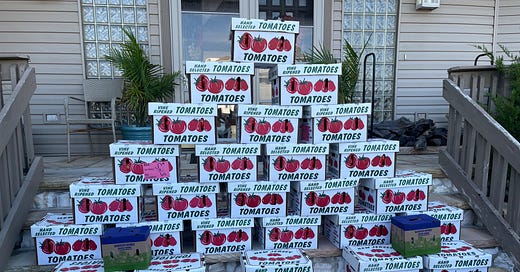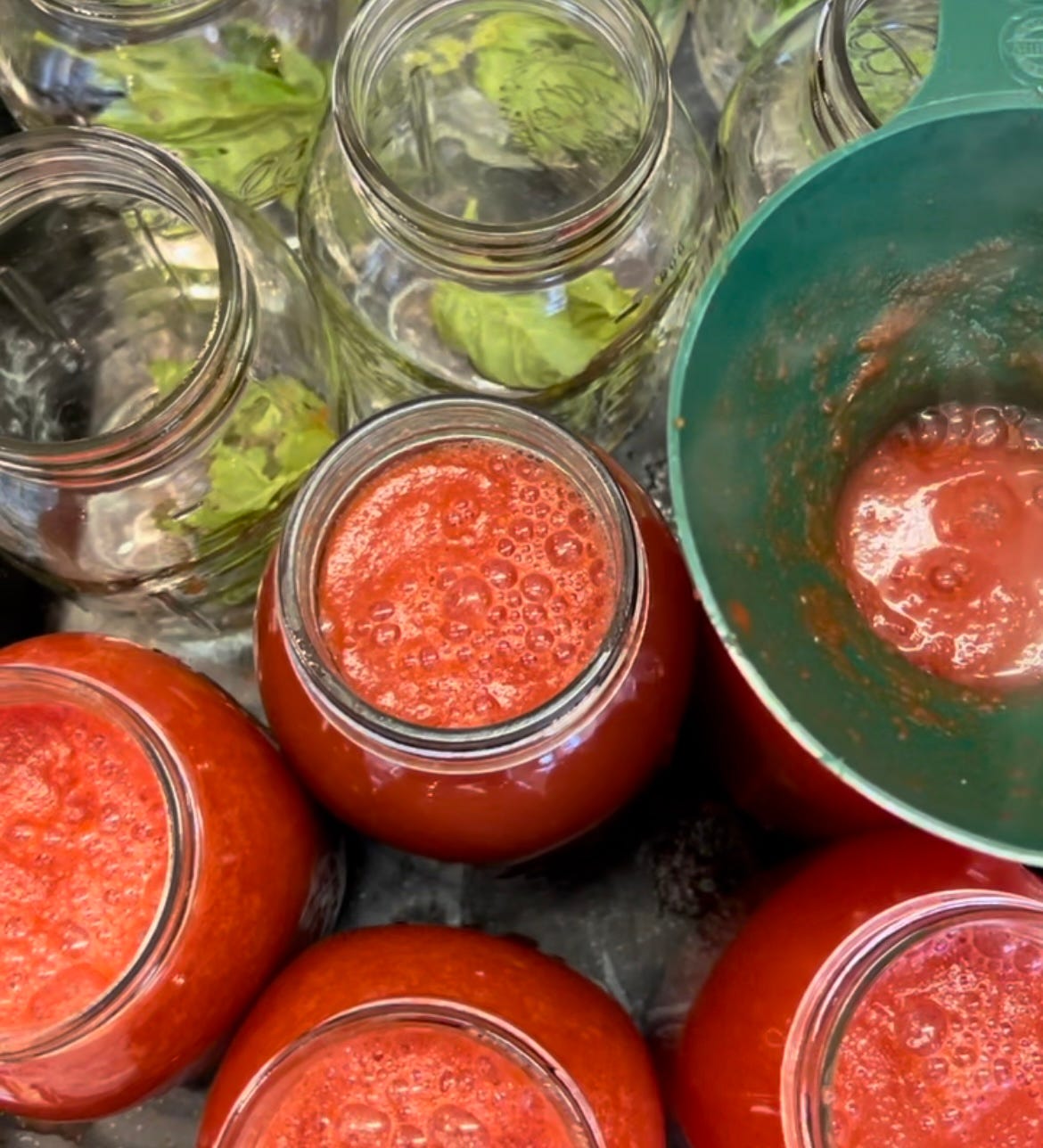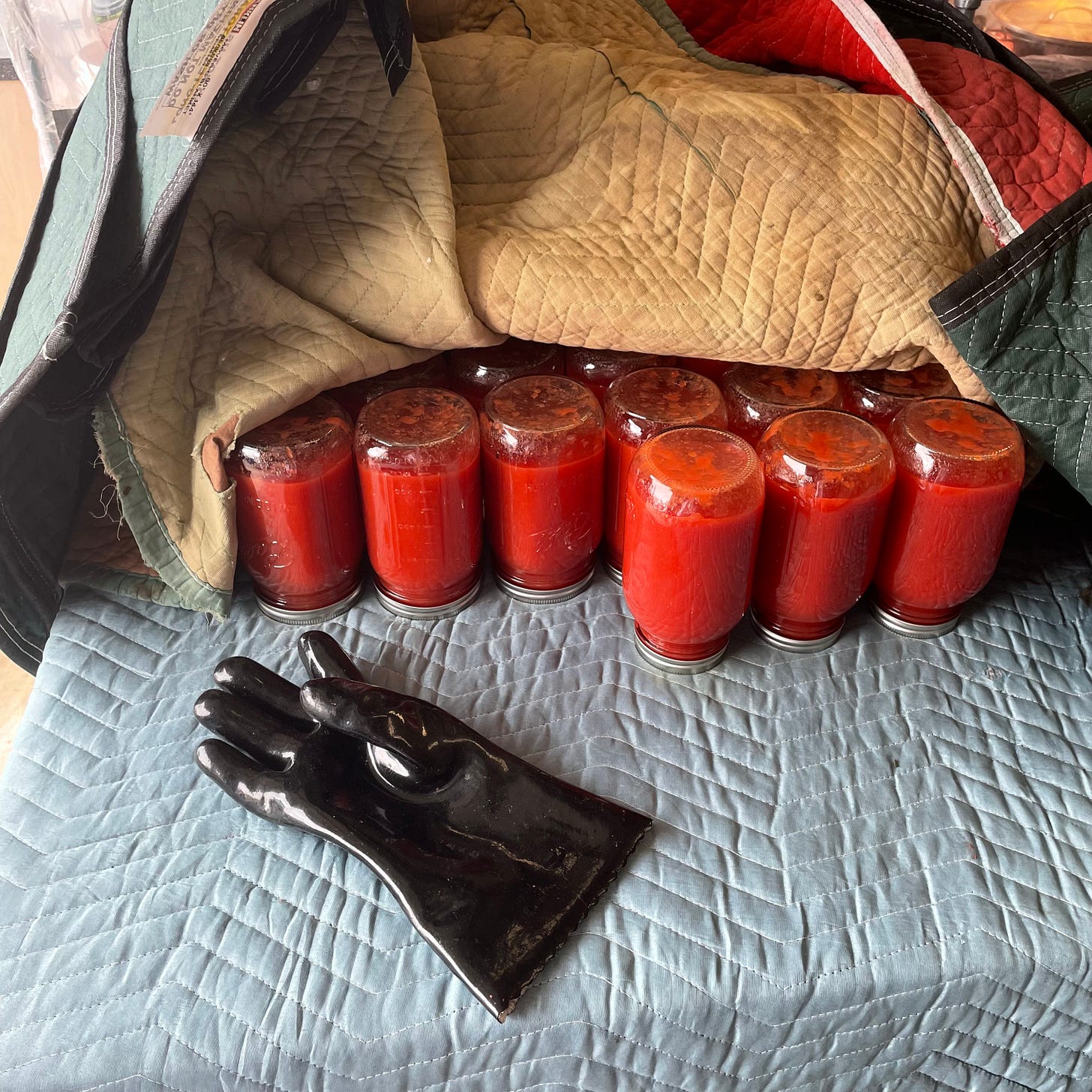It’s a Saturday morning in early September and traffic on the New Jersey Parkway is light. I’m on my way down the shore for Tomato Weekend, a tradition started by my aunt and uncle a decade ago. The mood for the occasion is celebratory, but the work is brutal: over the course of two days a dozen-or-so bushels of fresh tomatoes are heated and churned into a hundred-or-so jars of crushed tomatoes, preserving the ripeness of summer to be enjoyed in the depths of winter.
In the past Tomato Weekend coincided with the beginning of the school year, so I’d usually make some excuse about grading or curriculum planning to get out of it. I was supposed to miss it this year too, but after some emotional arm twisting my plans changed. My mother burst into tears of joy when I told her.
I pull off the Parkway around 9:15am and pat myself on the back: I’ve made great time and I’m sure I’ll be early. Of course, when I arrive at the house fifteen minutes later the whole production is already underway. I run inside, kiss my grandmother on the cheek, grab my custom “Gettin’ Saucy 2023” tee shirt, and head back out.
It’s blissfully mild, but my uncle has still set up a pop-up canopy outside the garage. My aunt, my cousin, my uncle’s cousin and her husband sit beneath it, huddled around a set of enormous, mismatched buckets filled with water and plum tomatoes. I pull up to the circle, tuck a hard seltzer beneath my chair, and join in the work.
Our first order of business is to remove the bitter core from the washed tomatoes. I pluck a plum tomato from a bucket filled with water, inspect it for any signs of damage to be removed, core the top with a paring knife and drop it into a second dry bucket. It’s mechanical, repetitive work: pluck, core, drop, repeat. After the first hundred or so tomatoes my coring becomes fluid. A gentle twist of the wrist unearths a squat cone of fibrous red flesh that gets tossed in the trash. My fingers prune, but the breeze and the conversation are light and refreshing. An auspicious start.
Inside the garage, my uncle sweats over two enormous pots that sit atop a pair of propane burners. He’s in his element, bedecked in his custom-made chef’s jacket adorned with interlocking Italian and American flags on the back. It’s hard to tell if Tony Soprano is an accurate representation of Italian American men like my uncle, or if my uncle’s personality has remolded itself to fit that image. It’s a real chicken-or-the-egg conundrum.
He barks for more tomatoes, and I dutifully bring them over; I’ve found that the path of least resistance with him is to simply do what I’m told without complaint. He carefully transfers the tomatoes into a steamer basket and places them into the pot of boiling water. “We’re gonna boil them until their skins split,” he tells me. “Make sure you write that down.” I make a mental note.
Once the skins begin to split, my uncle removes the tomatoes from the boiling water and pours them into another holding container. “Record this,” he yells, as my cousin takes a video on her phone. We wait until the tomatoes are cool enough to handle and then transfer some into a large colander. “You gotta press down on ‘em, but lightly! You wanna get rid of the extra water. Make sure you document that.”
My ears perk up. Again, that urge to record, the demand to be documented. It’s out of character for my uncle, whose usually so immersed in what he’s doing that the rest of the world seems to slip away. What is he scared will get lost? Does he simply want to make sure that I get all the details right in the essay that I inevitably write about this experience? I start taking more pictures, I start taking notes on my phone, and I start asking more questions.
The tomatoes go through the motorized press three times: that ensures that all the pulp and juice has been extracted, leaving behind only the seeds and skin.1 As I drop a heaving scoop into the funnel that feeds the machine, I ask my uncle how Tomato Weekend started, and where he learned how to make all of this possible.
The timing was simple serendipity: someone was throwing out their tomato press and he had taken it and repaired it to working condition. Then, inspired by childhood memories of his mother and uncles canning tomatoes for the winter, he had researched the steps needed to get from vine to jar. He had even reached out to my father’s cousins in Canada, who’ve been canning their own tomatoes for decades, for advice.
I begin to understand that I’m not just documenting this process for posterity. Rather, I’m recording my uncle’s miraculous raising of the dead. Tomato Weekend is an attempted resurrection: core memory and borrowed knowledge alchemized to bring the past back into the present. And it’s my job to write it all down.
The crushed tomatoes need to come to a simmer before they’re ready to be jarred. Rather than jumping back in to help core, or boil, or drain the tomatoes, I instead retreat to the air conditioning inside.
I’m not unaware of my vices: I’m an overeducated indoor kid who’d rather read than work; I bore easily when faced with monotonous tasks; when it comes to physical labor, I’m ready to quit as soon as I start sweating. The labor that goes into Tomato Weekend is the epitome of all the things I hate to do, which is perhaps why I’ve avoided it for so long. Everyone else seems to be having a great time, happy to press on when I’m ready to tap out. There’s a camaraderie that I feel alienated from. Or perhaps I’ve imposed that alienation on myself. I ponder this question as I stand in front of the open Frigidaire, trying to decide what to snack on.
I return to the garage about half an hour later; I needed a break, but I don’t want to be accused of being lazy. I ask my uncle to change the playlist. I’m tired of listening to Dean Martin and Sinatra on a loop like we’re in Moonstruck. We switch to Jimmy Buffet, who had unexpectedly passed away just the week prior; my uncle, a parrot head for decades, was crushed by his sudden death. The mood remains jovial, but like Buffet’s music there’s now a tinge of loss, a longing for a world that’s slipping through our fingers.
After adding a handful of salt to the pot, the tomatoes are finally ready. My aunt pulls the sanitized jars from the oven using heatproof rubber gloves and we drop a few sprigs of basil in each jar. We fill the jars to the brim — okay, I overfill a few — and each jar’s topped with a freshly cleaned lid and ring.
It’s at this point that I realize that there’s no pot of boiling water to submerge the jars of tomatoes in. I was under the impression that the jars had to be boiled, but my uncle assures me he has another method that works better. As each batch of jars is readied, he brings them over to the table in the middle of the garage and places them upside-down under a thick layer of heavy-duty moving blankets. Over the next twenty-four hours, he tells me, the residual heat will create a vacuum that seals the jars. I remain skeptical, but I keep my thoughts to myself.2
The next morning when we go to flip the jars they’re still too hot to handle without gloves. Miraculously, every single one of them has properly sealed. We celebrate with pasta and fresh sauce.
I take a dozen jars home with me later that afternoon. I start to think about what to write, how I’ll document this experience. I reflect on the privilege and burden of being designated the family storyteller. I turn north onto the Parkway to make my way home.
Thank you for reading My Nonna Era. If you enjoyed this post, please feel free to share it far and wide.
I’ve subsequently discovered that many old-school Italian Americans follow this “blanket method,” which is more time efficient than boiling when producing anything more than a dozen jars.










This is amazing! You are very fortunate to have this tradition. Kudos to your uncle for spearheading it!
I love it with a big THANK YOU!!! Chris, thank you again for taking all your notes and the writing down of this wonderful family tradition! I would also like to thank Raven for taking all the great photos and videos! It's not only about the sauce but bringing the family together to make lasting memories and sharing a great weekend with some great food, wine and music! I can only hope that one day you and Raven continue this tradition with your families!
Love Always,
Your Uncle Emanuele aka Tony Soprano